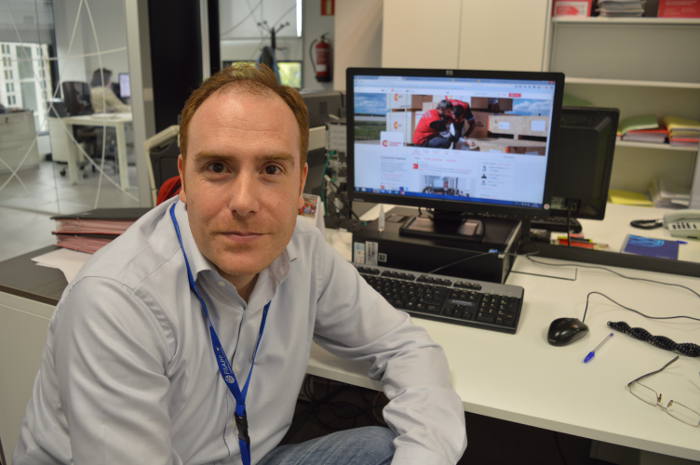-
21 October 2016
Category : Opinion
Are you an expert? You should communicate
El próximo lunes, 24 de octubre celebramos el Día Mundial de Información sobre el Desarrollo. Ángel González Suárez, Técnico de la FIIAPP (Comunicación- Cooperación Española), nos cuenta lo que supone la comunicación y cómo podemos comunicar.
 Angel González en su mesa de trabajo
Angel González en su mesa de trabajoA few weeks ago, I read an interview with anthropologist Arturo Escobar. In it he expresses his ideas on many subjects, including the role of experts and social media. He showed himself to be critical of the social transformation capacity of these communication channels and expressed an unflattering view of experts. Reflecting on his statements, I found myself somewhat in ‘no man’s land’ because, while they seemed on target, my experience raised objections.
Today we are all experts on something. There may be someone who has not accepted it (although our browsing, increasingly specialised and segmented thanks to Google, suggests otherwise), but categories, tags and keywords are here to stay in our digital reality. And up to a certain point, it’s good that there are experts, not because one has to emulate or praise them but because their experience can be very important for others, provided they communicate it.
Direct and personal communication
Before encouraging the experts on development cooperation, and especially those who have not yet started using social media, I will take this opportunity to recall some of the channels and genres that can help them:
· Blogs
These are spaces that are open to creation, commentary and interaction. In Spain there are various, some journalistic in nature, with a community of contributors (El País or eldiario.es), others started in the world of DNGOs (Pobreza Cero , Fundación CIDEAL and the many run by Spanish DNGOs), by international bodies (World Bank) or the Spanish Public Administration (MAEC which also has created an important document on Digital Diplomacy;FIIAPP, or the Spanish Cooperation portal whose work I would like to promote).
· Video blogs
This is a genre that still has not taken hold among our experts. It involves a high degree of public exposure (hence the influence of YouTubers) but can also generate greater empathy in the public, more so than the written word. (I’m not aware of any Spanish examples, nor of ones in Spanish, that focus their content on development, so don’t hesitate to point them out in the comments section).
· Social Media
How networks are used depends a great deal on the characteristics of each channel. Twitter is not the same thing as Instagram, nor Facebook the same as LinkedIn. I recommend starting with Twitter due to its simplicity. There are many examples of good use made by its devotees; at @CooperacionESP we try to follow many accounts that work with diverse styles and objectives. It’s worthwhile to visit numerous profiles before starting one’s own and, always, much better to move into it gradually.
Despite this, many experts, mainly those working in public institutions, hardly use this media to transmit their knowledge. I know that it’s difficult and that there are good reasons as to why they don’t do so:
- Lack of time.
- Fear of public exposure.
- Self-exclusion from communication tasks.
- Rigidity in the institutional structure.
- Lack of confidence in one’s abilities.
However, I don’t just think that this is an error, but that boosting the use of social media would serve to improve institutional communication.
Communicate what you know how to do
I’ll give you an example. Recently I had the good fortune to share my workspace with various experts on diverse subjects, all related to the field of development cooperation.
I had never had the opportunity to learn about Spain’s gender policy, nor the implication of and degree of detail whichmultilateral cooperation requires. The same thing was true for me regarding the coordination of donors within the OECD, the flows of Official Development Assistance, the process of coordination of any position that represents Spain, the commitment to improving health systems and attention to childhood in other countries, or the need to better evaluate our work.
Everyone should know about these subjects, especially if their taxes are supporting them. The difference between me and anyone else is that I had access to an expert.
Spanish Cooperation has a tremendous panel of experts. I’ve been finding this out in the past two years. They have experience in other countries, knowledge, a good network of contacts and a great deal of documentation (that cannot be found on the Internet). In terms of communication, all of this is a rich vein. I think that they can improve the existing communities and strengthen social commitment to cooperation, which is already high.
Implementation of an easy-to-use communication system for experts in public administrations is not terribly complicated; France and the United Kingdom have already done it, and our experts as well, for example, in the field of education for development. That’s why I would like experts and specialists to get more involved in communication. Time is of the essence. I never tire of saying it; they already have the most important thing: knowledge. Transmitting is much easier.
Look at Natalia Lizeth López López. I’m convinced that she will become an expert; in fact she is already a good communicator who we would not know about if not for YouTube. The same is true of many assets from the Spanish Cooperation. (By the way, and this is key, one of its experts ‘told me about’ the link).
Written by Angel González, FIIAPP (Communication- Spanish Cooperation)
The views and opinions expressed in this blog are the sole responsibility of the person who write them.






